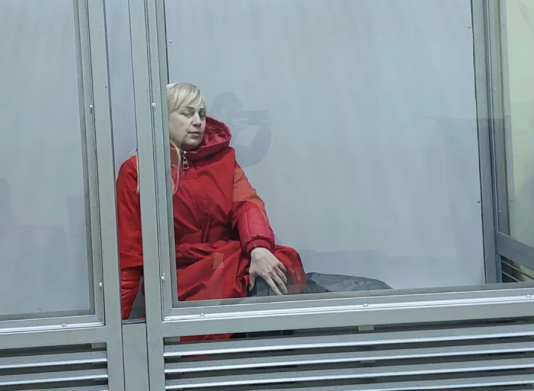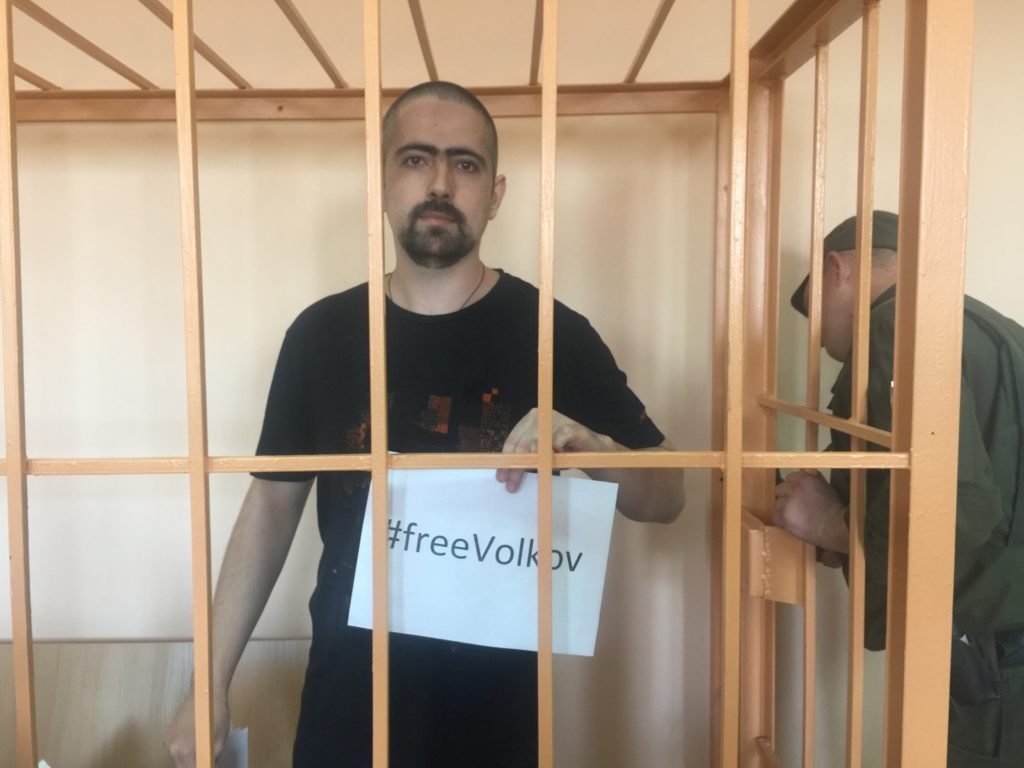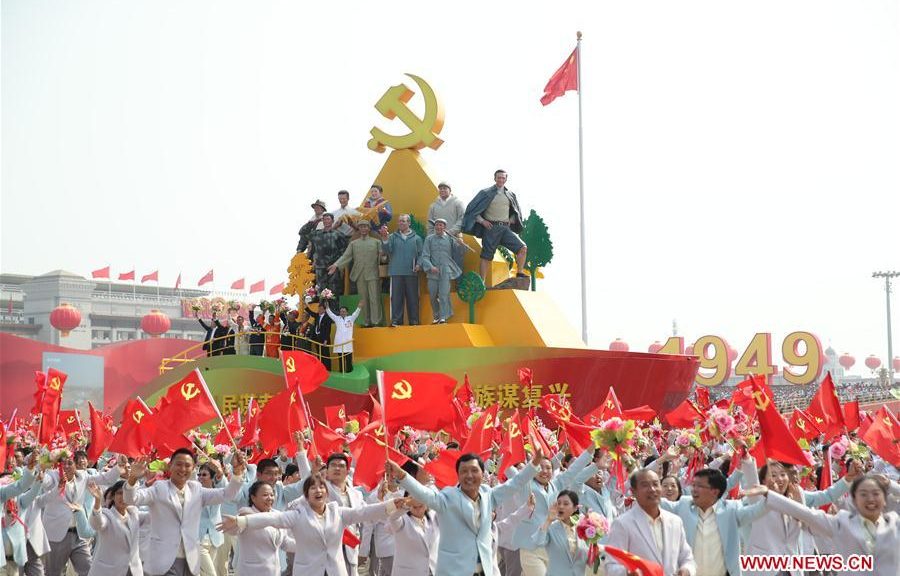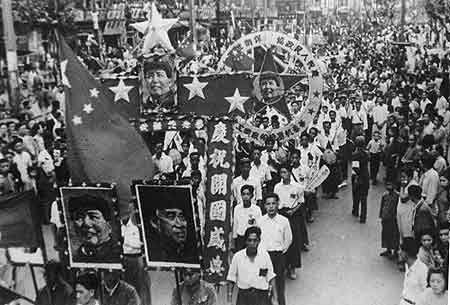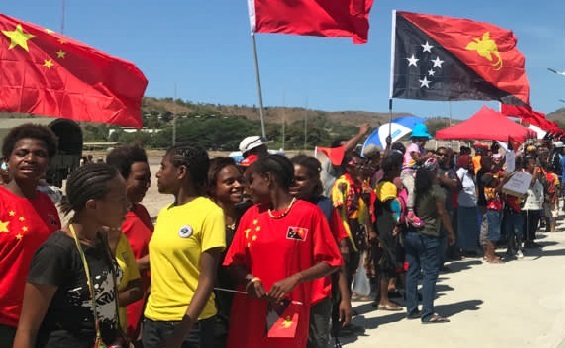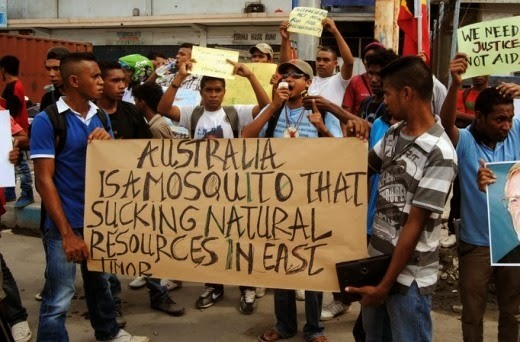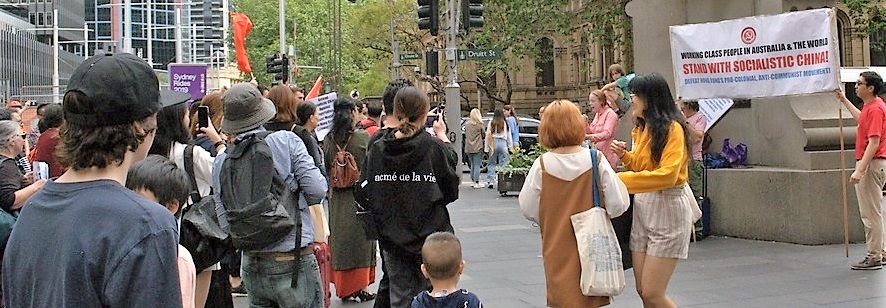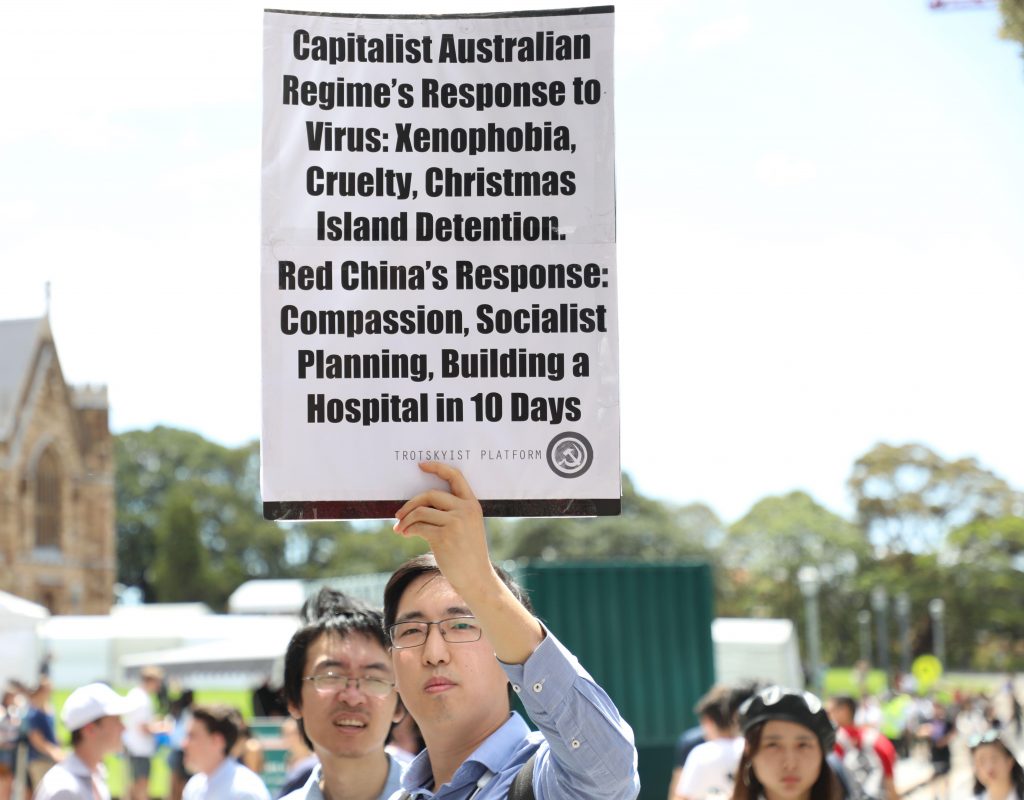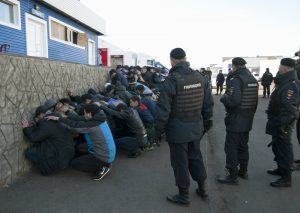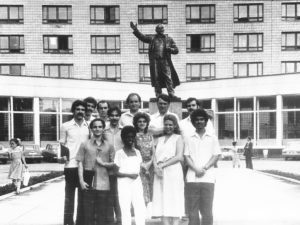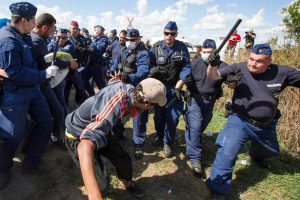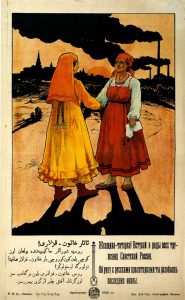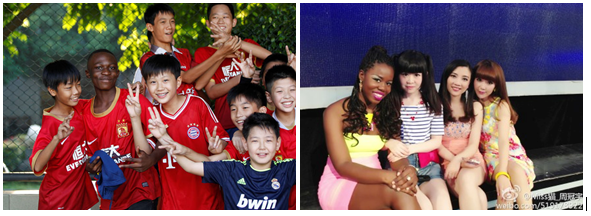Above: Political prisoner in Ukraine, Inna Ivanochko sits in a dock in a court. Inna Ivanochko is the head of the Lviv organisation of Opposition Platform — For Life, which was Ukraine’ second largest party in parliament until it was persecuted and then banned. She is facing up to 15 years in prison for expressing her political views in the years before the war started – which the Ukrainian regime have now retrospectively deemed to have been in the service of Russia. Her supposed “offences” include allegedly participating in a September 2015 protest rally over living standards grievances and violations of constitutional rights, taking court action in 2018 against a city council decision to knock down a monument to Soviet World War II soldiers and advocating turning Ukraine into a federal state during a 2018 television interview.
Photo: Supplied
Do Not Buy the Lie That Backing Ukraine’s
War Is a Matter of “Defending a Democracy”!
Down With the Albanese Government’s
Military Aid to Ukraine!
Free the Thousands of Leftist, Anti-War and
Anti-Nationalist
Political Prisoners
in Ukraine
25 June 2024: In late April, the Albanese Labor government announced yet another $100 million in “aid” to Ukraine. The new “aid” package includes air-dropped bombs and drones. The package was announced by deputy prime minister, Richard Marles during a visit to Ukraine where he encouraged the Ukrainian regime to continue its war against Russia. Marles also affirmed the continued participation of Australian soldiers in an operation training Ukrainian troops in Britain. Tens of thousands of Ukrainian troops have already been trained in this U.K.-led operation. The U.S. and European NATO powers and their allies, like the Australian imperialist regime, are prepared to fight to the last drop of Ukrainian blood to advance their proxy war against Russia.
As millions of low-paid workers, working-class youth, unemployed workers and pensioners suffer under soaring rents, Australian governments have failed to provide adequate funding for the public housing that could help drive down rents across the rental market. Meanwhile, governments of all stripes refuse to substantially boost the crushingly low Jobseeker payments. They say that there is a need to be “prudent” to avoid fueling inflation. Yet, when it comes to fueling death and destruction in distant lands to shore up Western imperialist domination of the world, successive federal governments have had no trouble finding large financial resources. The April announcement brings the Australian regime’s total military assistance to its Ukrainian counterparts to $880 million. Earlier announced Australian military support included the provision of armoured vehicles, six M777 155mm howitzers and artillery shells.
This military assistance is backed by all the parties in the Australian parliament, the entire mainstream media and all of Australia’s influential political think tanks. Yet despite this and the ruling class’ intense propaganda campaign supporting the proxy war against Russia, many Australians do not buy the government’s “rationales” for its military support to its Ukrainian counterparts. Indeed a poll conducted this month by the Australian government-controlled ABC news outlet found that a (small) majority of Australians actually want the government to wind back or end support for Ukraine.
One of the main narratives that Australia’s ruling class and other Western imperialist ruling classes use to justify their massive military backing of Ukraine is their claim that they are “defending a fellow democracy against an authoritarian power.” However the Ukrainian capitalist regime is no “democracy” of any kind! Fascist forces play a prominent role in Ukraine’s state organs. For example, a key part of Ukraine’s National Guard and prominent part of the regime’s ultra-nationalist folklore is the fascist Azov Assault Brigade. Formed in 2014 by neo-Nazi politician Andriy Biletsky, the Azov Assault Brigade sports Nazi regalia and trains its members in white supremacist and neo-Nazi ideology. It is notorious for murdering, raping and assaulting numerous leftists, members of ethnic minorities and civilians sympathetic to Russia. The character of the Ukrainian regime can also be seen from the fact that in 2015 it made two Nazi-collaborating, anti-Soviet paramilitary groups (the UPA and the OUN), “heroes of Ukraine.” During World War II, the UPA and OUN between them murdered 100,000 Polish people and tens of thousands of Jewish people, while helping their Nazi allies to carry out the Holocaust. The Ukrainian regime has also renamed many streets after the fascist leader of the OUN, Stepan Bandera; and have also erected numerous statues and other monuments to this Nazi-allied war criminal.
Capitalism and Democracy
Of course, the Western regimes using Ukraine are hardly true “democracies” themselves. To be sure Western governments are elected and citizens are theoretically able to advance their political views. However, in practice it is the wealthy capitalists, in great disproportion to their small numbers that have the means to shape public opinion and hence steer election outcomes. It is they who own the media, establish and finance the political think tanks, provide much of the funding for political parties and political NGOs and have the financial resources to pay for expensive political advertising and lobbyists. Thus in terms of political influence, “democracies” under capitalism run more on “one dollar, one vote” rather than the nominal, “one person, one vote.” Moreover, due to their tremendous wealth and control of the economy, the capitalists are able to ensure that all the key state institutions remain tied to them by thousands of threads irrespective of which political party is elected to govern. Therefore, in all nominally “democratic” capitalist countries, the form of “democracy” masks the reality that the system is in fact just a form of dictatorship of the capitalist class. To the extent that there is any real democracy it is only that the different capitalists and pro-capitalist factions are able to freely and “democratically” debate their differences and arrive at a majority decision about which policies best serve the interests of their class. Moreover, just as in more openly authoritarian forms of capitalist rule, whenever the rule of the capitalist class faces a serious challenge, the ruling class will resort to the most brutal authoritarian repression to protect their interests.
Nevertheless, as far as the working-class and other oppressed are concerned, this pseudo-“democratic” form of administering capitalism is preferable to other forms of capitalism – like fascism, military dictatorship etc – because it allows the masses comparatively greater freedoms with which to organise resistance against capitalist exploitation. That is why in capitalist parliamentary democracies like Australia, we oppose every attack of the ruling class on the limited democratic rights that the masses do have. And as decaying, late-stage capitalism is increasingly unable to meet the needs of the masses, in nearly every capitalist parliamentary “democracy” around the world the worried capitalist class is chipping away at the political rights that it had previously conceded to the masses. Just look at the hardline anti-protest laws that have been enacted in NSW and other Australian states and the federal government’s draconian “foreign interference” laws which are aimed at suppressing expressions of sympathy for socialistic China.
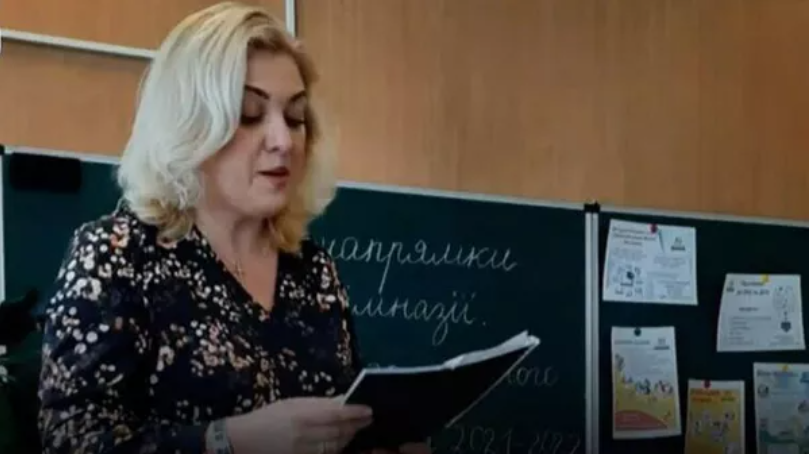
“I was arrested with my son in Khmelnitskiy [a city in Western Ukraine].
“Five cars surrounded us, and then they interrogated me for 72 hours, trying to get a confession. I didn’t sign anything, we were beaten, wrapped in a black and red flag [the flag of the Nazi-collaborating OUN-UPA]. I had to confess that I made some marks [for Russian bombs and missiles] and that I had given shelter to Kadyrovites [Chechens who are fighting for Russia], whom I had never seen in my life. And they took fingerprints, and forced me to pass a lie detector, and threatened to take me in the city square with an announcement that I was putting tags [was a missile gunner] so that the mothers of the murdered soldiers would beat me. Then they realized that I wouldn’t sign anything, put bags on my son and me and started leading us somewhere. They brought us to Kiev, my son was shoved into the basement in front of me, they demanded from him to say that I had killed people, pressed on my conscience, threatened. I was taken to the SSU building on Askold Lane, then to the Lukyanovo pre—trial detention center. The jailer showed me videos on her phone every morning – as far as I can understand, she was instructed to do this – how in both men’s and women’s buildings people were beaten, dipped their heads in the toilet, bullied. They demanded a confession from me to avoid the fate of people on these videos.”
Photo: Supplied
Today’s Ukraine – Not Any Kind of Democracy At All
Today’s capitalist Ukraine does not even have the truncated, “democratic” form of the dictatorship of the capitalist class that exists today in Australia, the U.S., France and other so-called “Western democracies.” Political parties and activists genuinely opposed to the Ukrainian government’s policies face severe and brutal repression. Such repression greatly intensified after a 2014 far-right coup, engineered by Washington and the European imperialist powers. That coup overthrew the elected government of Viktor Yanukovych who attempted to simultaneously maintain friendly ties with both Russia and the EU. Yanukovych’s government was replaced by a rabidly Ukrainian nationalist regime that was as fiercely anti-Russia as it was pro-Western. The new regime enacted laws discriminating against the Russian-speaking populations in the east of Ukraine as well as against other non-Ukrainian minorities. When the post-2014 regime inevitably met with opposition – especially in the east and south of the country – this was met with extreme repression supplemented by the terror of fascist gangs. In 2015, the regime banned the sizable Communist Party of Ukraine and two smaller other, nominally communist parties. Meanwhile the regime jailed or threatened political opponents and journalists.
Some Ukrainians have made courageous efforts to detail the persecution that others are facing at the hands of the Ukrainian regime. Among these is Ukrainian journalist Pavel Volkov. Volkov was himself imprisoned from 2017 for thirteen months for merely writing articles critical of the 2014 right-wing coup and for sympathising with the plight of the people of the eastern, mostly Russian-speaking, Donbass region who were attacked for their opposition to the new ultra-nationalist order. For this, he was accused of “separatism,” “terrorism,” and “collaboration with the enemy”. Due to the efforts of out of court supporters and a dedicated team of lawyers, Volkov eventually proved the charges false in court. However, this was a very rare case where the Ukrainian regime’s trumped-up charges against opponents have been defeated in the regime’s courts. Most of those targeted end up in prison or worse. Pavel Volkov described what he observed in the years 2018-2020:
“… people have been tried under `separatist’ and `terrorist’ articles for laying flowers at the Soviet monuments; paying taxes for DPR (Donetsk People’s Republic) [a pro-Russia rebel government that was established in the eastern Donetsk region by opponents of the post-2014 far-right regime]; organizing `Pushkin Balls,’ and so on. Any activity that can be interpreted as the glorification of the Soviet past, the valorization of the Russian culture, or the recognition of the authorities of rebellious Donbass came to be acknowledged as `separatist’ and `terrorist.’”
Since the outbreak of the Russia-Ukraine war in February 2022, the Ukrainian regime has used the cover of the war and the mantra of “defending national security against treason” to persecute its opponents to a yet more extreme degree. In June 2022, the regime banned the biggest opposition party, the Opposition Platform — For Life, a party which just 17 months before had been leading Ukraine’s opinion polls. Similarly, the regime banned several other parties – accusing all of either “collaborating with Russia” or “violating the sovereignty and territorial integrity of Ukraine” or “destabilising the social and political situation in Ukraine”. Among the parties that the Ukrainian regime banned include Viktor Yanukovych’s former party, the Party of Regions as well as Derzhava, Nashi, Opposition Bloc, Socialist Party of Ukraine and Union of Left Forces.
Anyone in Ukraine who expresses even the mildest sympathy for Russia or who advocates peace talks is targeted. Other dissidents are falsely accused of pro-Russia sympathies in order to silence them. As journalist, Pavel Volkov put it:
“Today, there are thousands of civilian prisoners in Ukraine who are deprived of their liberty and human rights for `likes’ under `incorrect’ social-media posts, Internet discussions of projectile impact location, frank correspondence with relatives in Russia via messengers, performing professional duties (like teaching) in the territories occupied and then abandoned by Russia, and so on. The retreats of the Russian Armed Forces from the Kiev region, parts of the Kharkov region, and parts of the Kherson region in later 2022 were marked by mass arrests, which continue to this day. This is what the SSU [Security Service of Ukraine] calls `the stabilization measures.’ Only in the summer of 2022, as a result of these `measures’ – apartment-by-apartment sweeps – 700 people were detained in Vinnytsa and Nikolaev – two regional centers in the southern part of Ukraine bordering the Odessa region.”
Although Volkov himself was forced to flee Ukraine in the latter part of 2022, he and his colleagues have since then painstakingly analysed the open source data of the various enforcement agencies of the Ukrainian regime in order to estimate the number of political prisoners there. They found that from the time of the 2014 far-right coup to the start of the Russian intervention in early 2022, the Ukrainian Prosecutor’s Office brought 643 cases to the court on political charges. This repression then escalated such that in 2022 and 2023 alone the Ukrainian Prosecutor General’s Office and regional prosecutor’s offices opened up 26,821 cases on political matters of which 4,315 have already been brought to the court with an indictment. Moreover, when the cases brought by the Ukrainian National Police and the SSU secret police are also included, Volkov and Co. found that the Ukrainian regime had opened up over 74 thousand criminal cases on politically motivated charges. This means that the number of people in today’s Ukraine who are in either prison or pre-trial detention on the basis of political charges is likely to be in the tens of thousands.
Among the laws that Ukrainian regime have used to persecute dissidents is Article 436-2 of Ukraine’s criminal code which nominally prosecutes people for: justification, recognition as legitimate or denial of the armed aggression of the Russian Federation against Ukraine or glorification of its participants. Articles 110 and 110-2 of Ukraine’s criminal code also targets people for expressing dissident views but does so under the official charge of: trespass against the territorial integrity or inviolability of Ukraine or financing of such actions. Volkov’s research shows that under these three articles of the criminal code alone, Ukrainian prosecutors in 2022 and 2023 have opened up 14,411 political cases of which more than 1,400 were already brought to court during that period. Under the likes of these type of pretexts, Professor Sergey Shubin from the Nikolayev region was sentenced to 15 years in prison for merely making reflections in his personal diary on what life would be like in the region if it were occupied by the Russian army. A pensioner from Sumy region Lyudmila Vazhinskaya was sentenced to six months jail for advocating peace talks between Ukraine and Russia while talking with people in a queue for milk. In a high-profile case, Inna Ivanochko, the head of the Lviv (city in western Ukraine) organisation of Ukraine’ second biggest parliamentary party (until it was persecuted and then banned), Opposition Platform — For Life, was arrested in August 2022 and has been in pre-trial detention ever since. She is facing up to 15 years in prison for expressing her political views in the years before the war started. These include allegedly participating in a September 2015 rally against low pensions, increased tariffs and violations of constitutional rights, taking legal action in a Lviv court (!!) against the 2018 decision of the Lviv City Council to knock down a monument to Soviet World War II soldiers and advocating turning Ukraine into a federal state (an idea which is branded “separatism” in contemporary Ukraine) in a television interview in 2018. Outrageously, the three lawyers who defended Inna Ivanochko have also all been arrested. The latest of her lawyers to be arrested was Svetlana Novitskaya who was seized on February 20 of this year and has been imprisoned ever since. She is accused of violating Article 436-2 of Ukraine’s criminal code, “denying the military aggression of the Russian Federation against Ukraine” … for her statements in court defending her client, Inna Ivanochko! Defence lawyers imprisoned for their submissions in court defending their clients – such is the “democracy” that the Australian and other Western capitalist rulers say that they are “defending” through sending huge quantities of weapons to their proxy!
Volkov’s research found that in 2022 and 2023 Ukrainian prosecutors had also opened 3,126 cases of suspicion of “High treason” under Article 111 of its criminal code and 7,058 cases on “Collaborationism” under Article 111-1. Most of the people imprisoned under such charges are those who worked in public institutions in the areas occupied by the Russian army. After the Russian troops withdrew from some of the areas, these public sector workers have been persecuted as “traitors” and “collaborators”. People like Anatoliy Miruta, a man from the Kiev region who was jailed for 10 years for negotiating with the Russian military to take local residents to the hospital and distributing Russian humanitarian aid. Or like, Valentina Ropalo, a resident of Volchansk in the Kharkov region, who was hit with a five year prison sentence for working as the head of the housing and communal services department while the Russian army was in her city, which was deemed to be “collaboration with the enemy”. Meanwhile, Olga Galanina, Deputy Chairman of the Berdyansk Administration for Humanitarian Affairs, is facing a life sentence because she agreed to continue her work in Berdyansk, Zaporozhye region, under the Russian administration. SSU officers kidnapped her student son in Dnepropetrovsk, illegally held him in detention, forcing his mother to come to the territory controlled by Ukraine, where she was arrested.
In addition to the political prisoners in Ukraine who have either been officially sentenced to jail or are in pre-trial detention, are a large number of others who have been abducted by the regime or its fascist auxiliaries. Among them is Sergey Chemolosov, a resident of the village of Ivanovka in the Kharkov region. Chemolosov had been distributing Russian humanitarian aid and helped restore the village’s electricity supply during the stay of Russian troops there. On 7 September 2022, Ukrainian military officers kidnapped Chemolosov and took him to an unknown destination. On September 9, Kirill Tymoshenko, the deputy head of the office of President Zelensky, published on Facebook a photo in which Chemolosov, with marks showing that he was severely beaten in custody, is sitting blindfolded with his hands tied. What later happened to Chemolosov or whether he is even still alive is unknown. It is also unknown the exact number of political prisoners that the Ukrainian regime has similarly abducted and is illegally detaining at secret locations.

Ivanovka in Ukraine’s Kharkov region, is shown in a Facebook post,
celebrating his detention, made by the deputy head of the office of President Zelensky, Kirill Tymoshenko. Chemolosov is blindfolded, with his hands tied behind his back and with marks indicating that he was beaten in custody. Two days earlier, Ukrainian military officers had abducted Chemolosov and taken him to an unknown location. Chemolosov’s “crime” is that he had been distributing Russian humanitarian aid and helped restore the village’s electricity supply during the stay of Russian troops in his village. What later happened to Chemolosov is unknown.
Down With the Ukrainian Regime’s Persecution of Leftists!
The pro-Western Ukrainian regime has especially targeted avowed communists, leftists and others with sympathy for the former Soviet Union. Thus Pavel Volkov’s research shows that among the politically motivated criminal cases that Ukrainian prosecutors have opened up in 2022 and 2023 are 600 cases of suspected violation of Article 436-1 of Ukraine’s criminal code, which bans the production and distribution of communist symbols and propaganda sympathetic to communist “totalitarian regimes” (which is mostly aimed at supporters of the former Soviet Ukraine and the former Soviet Union). Already 322 people have been brought before the courts on these charges. Formally, Article 436-1 also bans Nazi symbols and propaganda sympathetic to Nazi regimes. However, that part of the law is never applied – especially since support for Stepan Bandera and his Nazi-allied OUN is a key part of the official ideology of the Ukrainian regime. Article 436-1 of Ukraine’s criminal code was indeed never meant to target neo-Nazi elements. The proscription of Nazi symbols in Article 436-1 was included purely to obscure the stridently anti-communist nature of the law.
Many of the leftists imprisoned have been prosecuted under trumped-up charges under other articles of Ukraine’s criminal code. Among them is left-wing activist from Zaporozhye, Yuriy Petrovsky who was hit with a 15 year jail term for allegedly providing assistance to the Russian military. Also imprisoned is Bogdan Syrotiuk, a leader of the Young Guard of Bolshevik Leninists and who is associated with the International Committee of the Fourth International (ICFI). Syrotiuk was arrested eight weeks ago on trumped charges of “treason” because of his opposition to both the Ukrainian and Russian side in the war. If convicted by Ukraine’s thoroughly biased courts, Syrotiuk is threatened with a prison sentence of 15 years to life. The ICFI have held rallies outside Ukraine embassies in several cities demanding freedom for Bogdan Syrotiuk, including a June 14 protest in Canberra conducted by the ICFI’s Australian section, the Socialist Equality Party (SEP). We in Trotskyist Platform add our voice to the demand for immediate freedom for 25 year-old Bogdan Syrotiuk.
Trotskyist Platform demands the immediate release of all those imprisoned by the Ukrainian regime for expressing pro-Soviet, communist and other leftist sympathies. We say: Immediately scrap the anti-communist Article 436-1 of Ukraine’s criminal code! We also call for the immediate release of all those imprisoned in Ukraine for advocating peace in the war of for expressing sympathy for Russia or merely admiration for Russian culture. Those public sector workers branded as “traitors” and “collaborators” for performing their duties during Russian control of their villages and cities must also be immediately freed. Down with the Ukrainian regime’s mafia-style abductions of dissidents and those-branded as “Russian collaborators”! Lift the regime’s ban on the Communist Party of Ukraine! Lift the Ukrainian regime’s ban on all other leftist, anti-nationalist, anti-war and other opposition parties!
It should be noted that we support the campaign to free ICFI-associated Bogdan Syrotiuk despite our profound political differences with the ICFI and the SEP. Not least among our differences with the ICFI/SEP is our objection to their decision to “denounce the Russian military intervention in Ukraine” in February 2022 – a point which they have been reiterating of late – which undercuts their nominal position of opposition to both sides in the war and slants towards a position of partially defending Ukraine (a true defeatist on both sides stance would not have taken a position on the question of the February 2022 Russian intervention). Today, recognising that Ukraine’s war with Russia has become subordinate to the Western imperialist tyrants of the world, we in Trotskyist Platform call for the defence of Russia (despite its reactionary capitalist rulers) against imperialism and its Ukrainian proxies. In contrast, the SEP and ICFI continue to take a stated position of opposition to both sides in the war.
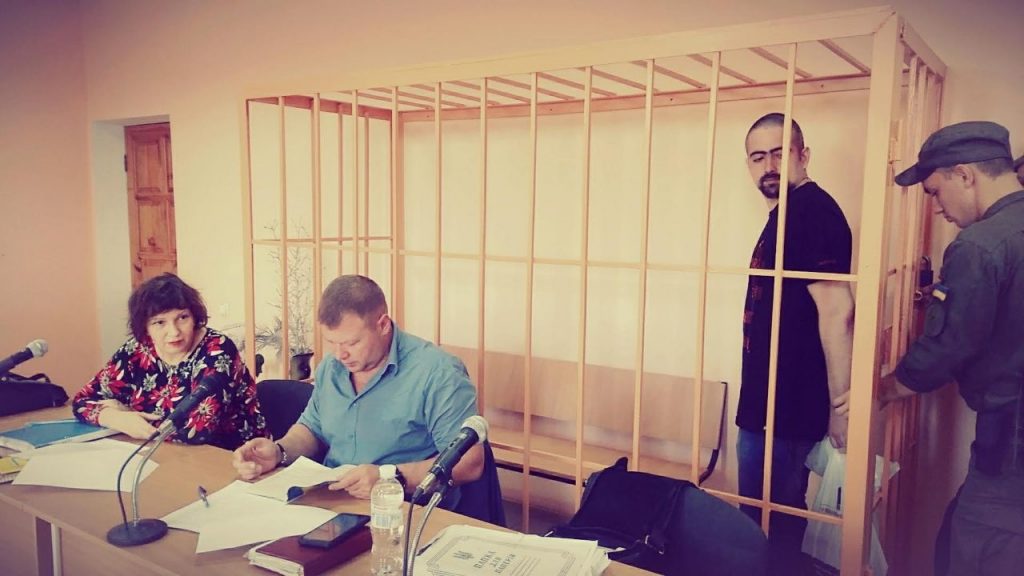
Photo: Supplied
Extreme Political Repression in Ukraine a Result of the
Early 1990s Capitalist Counterrevolution
The political repression in today’s Ukraine is far more intense and brutal than any repression that occurred in the Ukrainian Soviet Socialist Republic during the last four decades of the socialistic Soviet Union. To be sure, in the mid-late 1930s when the, by then bureaucratised, leadership of the Soviet worker state, under the impact of profound international defeats for the socialist movement, moved to the right in many areas – from international policy, to economic and social policies, to backsliding on Lenin’s 100% correct insistence on being sensitive to the national rights of the Ukrainian and other non-Russian peoples – the Stalin-led bureaucracy sought to muzzle potential resistance to this rightist turn with murderous persecution of the most devoted and thoughtful communists. Soviet Ukraine was especially hard hit by this repression for a several year period. However, from the late 1950s onwards, the jailing of political dissidents in the Ukrainian Soviet Socialist Republic (and indeed the whole Soviet Union) became relatively rare. Moreover, the political prisoners that did exist in Soviet Ukraine during this period were largely not leftists. Rather, Soviet Ukraine’s repression mostly targeted opponents of socialistic rule – something which even a workers state operating under the ideal form of workers democracy may be compelled to do during the transition to full socialism if it is facing a world where the richest, most economically powerful countries of the world continue to be under capitalist rule.
All this is important to understand because the fanatically anti-Soviet Ukrainian regime and its imperialist masters present today’s Ukraine as “democratic” as opposed to the “totalitarian” Soviet period. Similarly, they portray the period of the Ukrainian Soviet Socialist Republic as an unending series of horrors in which the Ukrainian people were supposedly “oppressed” by Russians. However, during the Soviet Union’s hey days in the late 1950s, 1960s, 1970s and early 1980s, the masses of the Ukrainian Soviet Socialist Republic enjoyed full employment, free high-quality education, free health care and a rich cultural, entertainment and sporting life. The 1917 great October Socialist Revolution not only freed all the toilers of the former Russian empire from capitalism but it liberated the people of Ukraine from the intense national oppression that they faced in the pre-Soviet days when they were under the thumb of Russian imperialist rulers. To be sure, during certain periods of Stalin’s administration of the Soviet Union, there were bouts of partial re-institution of policies offending the Ukrainian people’s legitimate national feelings. However, from the late 1950s onwards, although there remained a degree of Russian centredness in the Soviet bureaucracy, the culture of the minority nationalities of the socialistic USSR again flourished with renewed vigour along with the economic standard of living of their peoples. It could not be said that the people of Ukraine were nationally oppressed in this period. Indeed, by the latter days of the Soviet period, the average life expectancy in Soviet Ukraine was nearly a year and a half higher than in Soviet Russia.
However, the Soviet workers state faced intense hostility from the considerably richer imperialist powers. The immense external pressure that capitalism exerted upon the Soviet Union resulted in a conservative bureaucracy being squeezed up to the top of the workers state. The rule of this bureaucracy, with its petty privileges, politically and economically weakened the workers state. Through suppressing workers democracy, the bureaucracy retarded the Soviet Union’s socialist planned economy from reaching its full and tremendous potential. Eventually, under the relentless pressure of the imperialist powers and the economic stagnation that this caused, the bureaucracy started making more and more international and domestic concessions to capitalism. This encouraged a layer of petty capitalists and speculators and highly educated, mostly younger, people – who were seduced by the promise that capitalism would bring them the standard of living enjoyed by the upper and upper-middle classes in the West along with “democracy” – to push for outright capitalist counterrevolution. They spearheaded their push under the cover of fighting for “democracy”. In Ukraine this was supplemented with virulent Ukrainian nationalism. Yet despite their promises and the massive backing they were gaining from the U.S.-led imperialists, most of the people of Soviet Ukraine did not support these counterrevolutionaries. In a March 1991 Soviet-wide referendum on whether or not to maintain the Union of Soviet Socialist Republics, more than 71% of the people of Soviet Ukraine voted to maintain the Union of Soviet Socialist Republics in a referendum that had a nearly 84% turnout in the Ukrainian Soviet Socialist Republic. However, although the majority of the people of Soviet Ukraine – and indeed the whole Soviet Union – were wary of those who wanted to overthrow socialistic rule, lacking authentic leadership and being depoliticised by decades of bureaucratic rule, they were confused as to what to do and, to an extent, were even unclear about the need to forcibly resist the emerging counterrevolution. As a result, a relatively small layer of imperialist-backed counterrevolutionaries were able to destroy the greatest victory the working classes of the world have ever achieved, while the working-class masses watched on by.
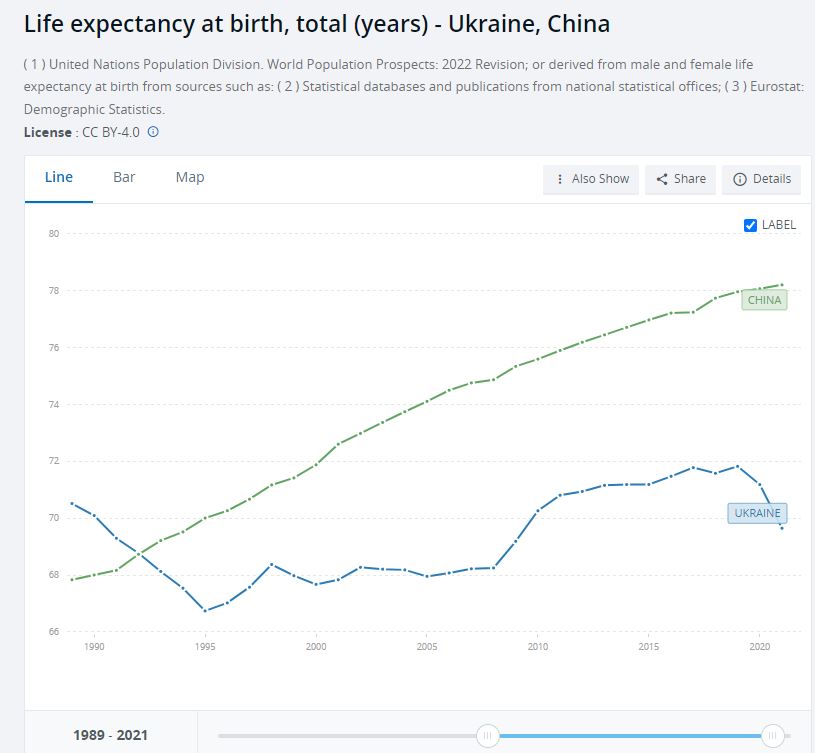
Source: World Bank
The 1991-1992 capitalist counterrevolution and the resulting conversion of collectively-owned, public enterprises into the private ownership of a few was a disaster for the toiling masses of Ukraine. Indeed it was a catastrophe for all the masses of the former Soviet Union. Unemployment soared, people were driven into poverty, industries were dismantled, the social position of women diminished and ethnic tensions intensified. And far from the “democracy” that the leaders of the capitalist counterrevolution promised, every part of the former Soviet Union saw political persecution of opponents. In October 1993, pro-Western “democratic” Russian president, Boris Yeltsin unleashed tanks against protesters and his own parliament, killing nearly 150 people.
Such political repression in all ex-Soviet countries is driven by two inter-related factors. Firstly and most importantly, the capitalist counterrevolution reduced the living standards of much of the population. Bitter about their position and having known a better life in the Soviet days, the masses could not be held back from opposing the new social “order” through propaganda and nationalism alone. The new capitalist rulers also needed to unleash brutal political repression to keep the masses in check.
Secondly, the political repression in the now capitalist countries existing in the lands of the former Soviet Union is partly connected with the particular forms of capitalism that arose from the capitalist counterrevolution. In the lands that have never been workers states, capitalism emerged from feudalism (except in some settler colonies when it was brutally imposed on first peoples often living in egalitarian hunter-gatherer type societies) as a higher, more progressive social system than the one that it replaced. Then, after having exhausted its initially progressive content, now decaying capitalism brought only suffering to the masses, social reaction, imperialism and catastrophic inter-imperialist wars; while still containing elements of its ability to develop the productive forces further than the feudalism that it had replaced. However, when capitalism was re-introduced to the lands of the former Soviet Union, it had absolutely no traces of the young, initially relatively progressive, capitalism that replaced feudalism. Instead, the capitalism that was transplanted into the lands of the former Soviet Union was entirely the decrepit, reactionary capitalism of the late 20th century. Moreover, this capitalist rule was not replacing a still more oppressive feudalism but replacing a higher, more progressive social order – one based on collective ownership of the means of production and working-class rule. Therefore, inevitably, the new capitalist ruling classes dreamt not mainly of expanding the productive forces to boost profits but of looting the productive capacity that was already there and of making a killing by dismantling and selling off the former Soviet Union’s massive industrial base. The capitalism installed into the lands of the former Soviet Union was an especially corrupt and venal form of capitalism. Alongside the plunge in the masses standard of living caused by the reversion to a reactionary social system, capitalist restoration in the lands of the former Soviet Union led to a retrogression in the moral substance of the people. The destruction of a collectivist-based economic system and its replacement with one-based on exploitation and dog-eat-dog competition – especially in conditions of newly arisen poverty – has pushed many to abandon some of the caring, mutually aiding outlook that Soviet people were famous for in favour of a ruthless jostling for scarce jobs and assets. For all these reasons, the capitalism that arose on the ashes of the Soviet workers state has been a mafia-style capitalism, characterised by the close inter-twining of capitalists with criminal gangs and collaboration between state agencies and criminal groups. The brutality of the state organs in the now capitalist, ex-Soviet countries is then in part driven by their “need” to defend the interests of the particular capitalists-criminals that they are collaborating with by mercilessly suppressing the objections of both rival mafia capitalists and those citizens daring to challenge this corruption.
However, at the same time, more far-sighted elements within the capitalist classes in ex-Soviet countries see the need to bring order to their capitalism in order to ensure the efficiency and viability of their system. They seek a political force – typically centred around a “strongman” – to achieve this task. When such a political force is pushed into power by the dominant elements of the capitalist class, this force uses ruthless repression to make particular capitalists – and the sections of the masses that these bigwigs have brought around them – sacrifice some of their short-term criminal-linked plunder in order to ensure the overall interests of the capitalist class as a whole and the long-term survival of the capitalist order. This is the role played in Russia by Putin. The fact that he performs this function reasonably effectively is the reason why he has been backed by the majority of Russia’s capitalist exploiting class for so long – despite his occasional crackdowns on particular oligarchs. To be sure, the discipline to capitalism that such strongmen bring often does not apply to their closest friends and relatives within the capitalist class! That is why the capitalists closest to Putin are given favoured treatment – as long as they don’t drift into opposition to him (like late Wagner Group boss Yevgeny Prigozhin did!).
Yet, even amongst the repressive capitalist regimes in the countries of the former Soviet Union, today’s Ukrainian one is especially brutal. There are several reasons for this. One reason is that the people of Ukraine have suffered from capitalist counterrevolution especially hard. Notably, despite all the advances in modern health science over these last three decades, Ukraine’s average life expectancy in the year before the recent war began (2021) was actually lower than it was in 1989, the year before Ukraine and the rest of the USSR started sliding rapidly towards capitalist restoration! Moreover, whereas at the end of the Soviet times in 1990, Ukraine’s GDP per capita (as determined by the more relevant PPP – Purchasing Power Parity – method) was 95% of Russia’s, i.e. basically the same despite being far more resource poor than Russia; by 2021, the year before the war began, her per capita income was less than half that of Russia’s (46% of Russia’s to be exact). By the way, this comparison alone should smash the notion that Ukraine was a “subjugated” nation in Soviet times that became “liberated” through the destruction of the Soviet Union! However, the main point for us here is that the working-class masses of Ukraine have suffered even more cruelly from the capitalist counterrevolution than the masses of Russia. And therefore the regime enforcing capitalist rule in Ukraine has been compelled to use still more brutal repression to keep the unhappy masses in line.
The second reason why repression is particularly severe in Ukraine is because the regime there took an especially fanatical anti-Soviet turn after the 2014 right-wing coup. They began knocking down monuments to the Soviet Union and to the Red Army’s victory over Nazi Germany. The regime even passed a law banning, under the threat of up to five years imprisonment, any singing of the Communist Internationale or the Ukrainian Soviet and Soviet anthems and any flying of the flags of the former Ukrainian Soviet Socialist Republic and the former Soviet Union! Yet a considerable proportion of Ukraine’s population is either old enough to remember how much better life was in Soviet times or at least old enough to hear such accounts from their parents and their aunts and uncles. To people who remember fondly and are proud of the achievements of the Soviet Union and of the Red Army’s heroic victory over Nazi Germany, the extreme anti-Sovietism of Ukraine’s ruling elite and its hailing of anti-Soviet, Nazi collaborators are unbearably offensive. This is especially true for the peoples of the southern and eastern parts of Ukraine, who have been less blinded by extreme nationalism than peoples in the western Galician region generally have. Thus to enforce its anti-Soviet laws, practices and ideology, the regime has had to use naked repression and intimidation against the significant percentage of pro-Soviet minded people in the country.
Thirdly, given that a significant part of Ukraine’s population speak Russian as well as other non-Ukrainian languages – including Hungarian, Moldovan and Romanian – as their first language, the post-2014 Ukrainian regime’s discrimination against the use of non-Ukrainian languages inevitably provoked strong resistance. Such discrimination is itself a result of the majority of the capitalist class realising that it could only protect itself from the wrath of the masses, discontented as they are over high unemployment and poor living standards, through diverting their anger onto Russian-speakers and ethnic minorities. Ukraine’s rulers are hardly the only capitalist ruling class to enact language discrimination in order to divide the working-class masses and prevent united multi-ethnic mass struggle against themselves. And they are hardly the only regime to face a revolt as a result of such discriminatory language policies! For example, in Sri Lanka, the majority of the capitalist ruling class, terrified by a massive 1953 general strike, which united workers from both the majority Sinhala ethnicity and the minority Tamil ethnicity, in the following years introduced language laws that ostentatiously discriminated against Tamil speakers. It was this discrimination against Tamil language speakers that in good part eventually led to the rise of the Tamil armed national liberation struggle. And similar to Sri Lanka, the Ukrainian regime’s language and other social discrimination against non-Ukraine speakers can only be enforced with brutal state repression against those who resist.
Fourthly, and in good part for the above three reasons, a significant part of Ukraine’s population does not want to fight a war with Russia. Many even sympathise with Russia, which is seen as less oppressive of pro-Soviet sentiment than the Ukrainian regime as well as obviously being more tolerant of Russian speakers. Terrified by this reality, the Kiev regime unleashes hysterical repression and violence against dissidents – both real and perceived.
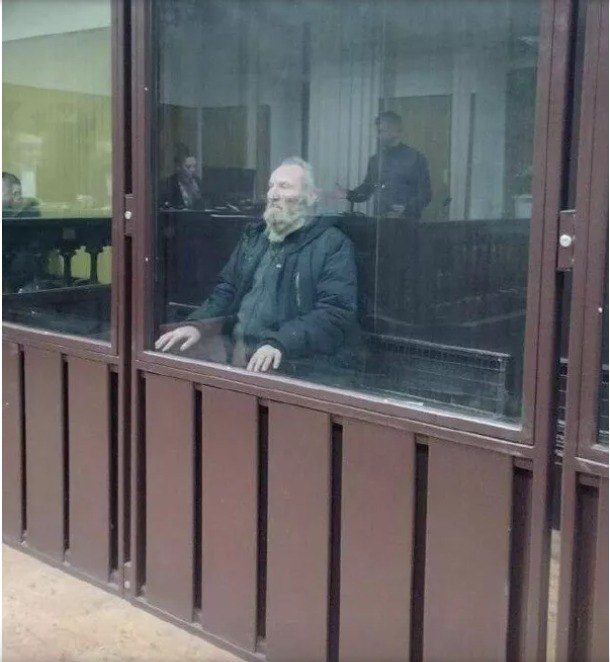
Photo: Supplied
Fifthly, the Ukrainian regime has a sizable support base of fanatical nationalists from which to launch repression against its opponents. Although a significant part of Ukraine’s population rejects the regime’s extreme anti-Soviet and anti-Russian hostility, there is also a sizable part of Ukraine’s self-employed and middle class population who have fallen for the extreme Ukrainian nationalism that they have been fed by the majority of the country’s capitalist class. They have bought the ruling class’ lying anti-Soviet propaganda. However, there is also a genuine fear amongst Ukrainian people that they will be subordinated by a new Russian empire as the Ukrainian people truly were in pre-Soviet, Tsarist times. These fears are born of the reality that today’s Russian Army is not the Soviet Red Army that liberated Ukraine from the Nazi invasion (and from Bandera and other Nazi collaborators). And today’s Russia is no longer a Soviet Russia that proclaims “Friendship of the Peoples” but a capitalist Russia whose rulers openly hail the expansionist, Great Russian chauvinist, Tsarist times. Ukraine’s capitalist rulers manipulate their people’s fear of being subjugated by Russia and inject into those legitimate fears ultra-right-wing nationalism, fanatical anti-Sovietism and loyalty to the program of Bandera and other Nazi collaborators.
In summary, capitalist counterrevolution has not brought the masses in the former Soviet lands any of the prosperity and “democracy” that the counterrevolutionaries promised – not even the token form of “democracy” that exists in Western capitalist countries. Indeed, it has brought the very opposite! This is true throughout all the lands of the former Soviet Union – and is especially true in today’s Ukraine.

Photo (top): X/Twitter @ukraine_world.
Photo (below): Peter Volek/JetPhotos.Net
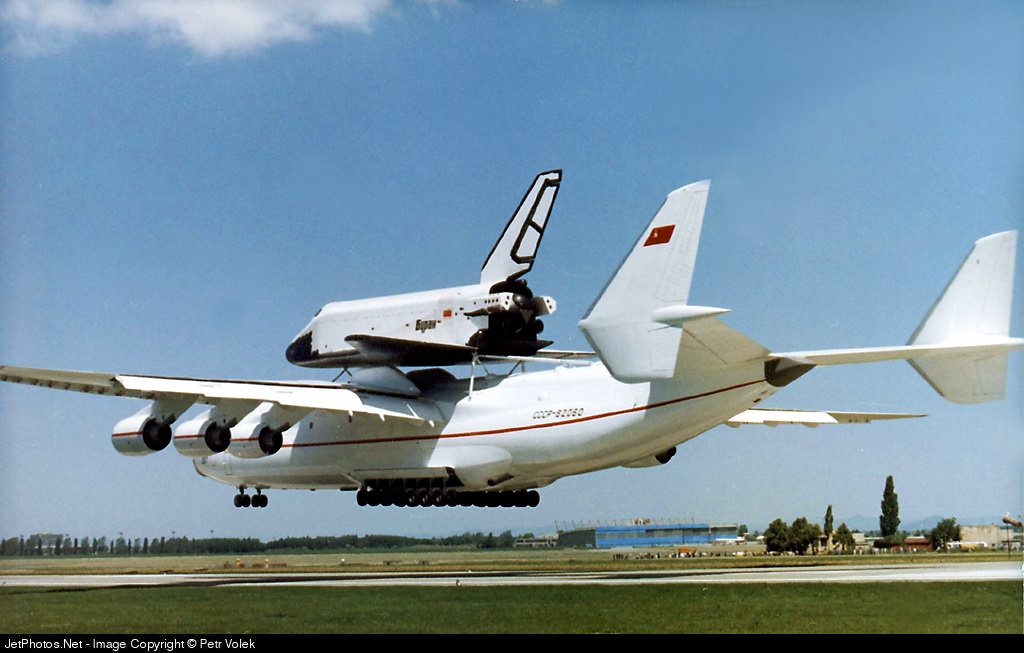
Defend Russia Against Imperialism
and its Ukrainian Proxies!
The Ukrainian regime’s imprisonment of tens of thousands of political prisoners blows to smithereens the claims of the Australian and other Western capitalist governments that they are backing Ukraine’s war in order to “defend democracy.” So what then is actually driving Ukraine’s war with Russia? When Russia first intervened in February 2022, the war was mostly an inter-capitalist squabble for territory. Ukraine wanted to forcibly keep lands in the eastern Donbass region where the majority of residents, mostly Russian speakers enraged at the fanatically anti-Soviet and anti-Russian character of the post-2014 regime, no longer wanted to be part of Ukraine. On the other hand, the Russian regime, encouraged by the ethnic/cultural solidarity of many of its people with the embattled Russian-speaking population in the Donbass region, wanted to not only grab the clearly pro-Russia portions of Ukraine but to gain additionally territory in regions where the majority of residents did not want to be part of Russia. Both the Ukrainian and Russian governments were driven by the needs of the respective capitalist classes that they serve to maximise the size of their guaranteed markets and the extent of raw materials under their control by maximising their country’s territory. For this reason, when Russia first entered Ukraine in February 2022, we called for opposition to both sides. At the same time, given that our “own” capitalist rulers and its U.S. senior partners were clearly backing Ukraine, we had a tilt that especially emphasized opposition to Ukraine. We demanded an end to all Western sanctions against Russia and an end to all Western military aid to Ukraine.
However, even from the first days of the Russian intervention there was another aspect to the conflict. The Western imperialist powers wanted to extend NATO to Russia’s borders in order to intimidate her. The imperialist powers wanted to prevent Russia from becoming a potential great power rival and hoped that they could instead, one day, again reduce Russia to the humiliated and dependent status that she had in the first decade after the capitalist counterrevolution. The imperial powers also hoped to pressure Russia into abandoning her friendly ties with socialistic China so that they could advance their main global strategic goal – to overthrow the Chinese workers state. Ideally, the imperialist powers hoped that through exerting pressure on Russia they could foster a “colour revolution” there that would bring to power a Western subservient regime – like the Yeltsin-Putin regime of the 1990s or the Ukrainian regime of today. Against these plans, Russia’s rulers understandably wanted to retard the encroachment of NATO to its borders.
Initially we judged that this driving force of the conflict was less a factor than the inter-capitalist squabble for territory. However, in our initial detailed coverage of the conflict, we foreshadowed the possibility that the antagonism between the Western imperialist powers and Russia could become the main aspect of the war. Within several weeks into the conflict, this is what indeed occurred. This was shown in late March-early April 2022 when Ukraine and Russia were on the verge of agreeing to a peace deal. However, that was scuttled by not only pressure on Zelensky from Ukraine’s fascist groups but by the diktats that the Western powers made to Kiev. Indeed on 9 April, then British Prime Minister Boris Johnson made a surprise visit to Kiev where he publicly told the Ukrainian government that no peace deal should be made with Russia. The following month, the U.S. announced a package of arms to Ukraine that was on a qualitatively greater scale than earlier military backing. It had become clear that although the element of inter-capitalist squabble between Ukraine and Russia remained, this was now the minor factor in a war that had become largely a conflict between Western imperialism and Russia, with Ukraine the proxy of the former. Although Russia’s capitalist rulers themselves long to build a new imperialist empire, they currently have neither the capital to do so nor the alliance of a wealthy imperialist power that could allow them to gain a stake in imperialist lootings through acting as a military enforcer for their ally. Therefore, what we now have is a proxy war between the real imperialist plunderers of the world and a capitalist but not imperialist Russia. Therefore, we in Trotskyist Platform called to defend Russia in the conflict, headlining in an article outlining our updated position: “Don’t Let the Western Capitalist Rulers Reinforce Their Tyranny Over the World! Defeat U.S., British, Australian and German Imperialism’s Proxy War to Weaken and Stifle Russia!” As our article explained:
“Such a defeat would weaken the ability of the imperialists to mobilise further predatory interventions abroad. It would also deter their plans to use Taiwan as a proxy to pressure socialistic China or even to incite a world war against the socialistic giant. Moreover, any setback for the U.S. imperialists and their allies in this proxy war would give encouragement to the resistance struggles of all those being subjugated by the U.S. and its allies elsewhere, like the Palestinian people suffering under incessant Israeli terror. More generally, a defeat for the Western powers in their Ukraine proxy war could only encourage the toiling masses of Africa, Latin America, the South Pacific and most of Asia to resist in their own lands the various Western capitalists that super-exploit labour, plunder natural resources, leach loan interest repayments, seize markets and manipulate and stand over governments. Within the Western countries themselves, a defeat for the capitalist ruling classes in their proxy war would weaken their authority. It would thus open opportunities for the working class and oppressed to wage mass resistance against soaring rents and food and fuel prices, plummeting real wages, the incessant expansion of insecure work forms and brutal racist oppression of persecuted communities.”
Our updated position meant that we were no longer calling for the Russian working-class to oppose the war effort of its own rulers – we were only making such an appeal to the Ukrainian masses. But for our work in Australia, the updated line did not change our fundamental slogans on the war. What it did do is to increase the urgency to oppose Australian military support to Ukraine as part of opposing the entire U.S.-NATO-led proxy war against Russia. As part of this it is necessary to campaign to free all leftist, anti-war, anti-nationalist and other political prisoners in Ukraine. This is not only to save tens of thousands of people from terrible suffering or even torture and death but to expose the lie of the Australian and other Western rulers that they are “working to defend democracy in Ukraine”.
Free the Political Prisoners in Australia Too!
It is possible through a campaign of exposure and agitation in Australia and other Western countries to make headway in winning the release of the political prisoners in Ukraine. This is because the Western regimes ability to make their own populations accept military aid to Ukraine depends on convincing their own populations that the arms are going to “defend a democracy against authoritarianism”. Therefore, exposure of the anti-democratic nature of the Ukrainian regime could significantly embarrass their Western masters and force the latter to push the Ukrainian regime to try and improve its image by releasing some of its political prisoners. In a similar but slightly different way that is how opponents of Cold War McCarthysim, demanding freedom for pro-North Korea political prisoner in Australia, Chan Han Choi and an end to the broader McCarthyist persecution of supporters of socialistic states, ended up pressuring the Australian regime to give Choi a much shorter sentence than the regime had been planning. Since attacking socialistic North Korea and its socialistic Chinese ally over “human rights” is the key method that the Australian rulers use to mobilise their own populations behind their Cold War drive against these countries, our agitation, exposing how the Australian rulers were violating the human rights of a North Korea supporter and how this was symptomatic of both the bogus character of the regime’s claims to stand for “human rights” and of the biased, anti-working class nature of its “justice system”, was very politically damaging to them. And it is only when our struggle against the capitalist exploiting class – and the state organs that enforce their interests – does political damage to them does the capitalist ruling class ever retreat. So let us fight to win freedom for political prisoners in Ukraine by politically damaging the Australian and other Western rulers through exposing the mass incarceration of dissidents by their supposedly “democratic”, Ukrainian proxies.
We cannot call for freeing political prisoners in Ukraine without also calling to free the political prisoners in Australia. The latest of these is David McBride, the whistleblower who was last month despicably sentenced to 5 years and 8 months in prison for passing information to the media that had the effect of exposing a large number of horrific war crimes by Australian special forces troops in Afghanistan. The other three political prisoners here are victims of the Australian ruling class’ enthusiastic participation in imperialism’s Cold War drive against socialistic China. The latest of these political prisoners to be jailed was Di Sanh Duong. Duong was outrageously sentenced to nearly three years in prison for supposedly “preparing to conduct foreign interference” on behalf of China, because he … publicly donated money to a Melbourne public hospital charity! Additionally, many Aboriginal people in prison, although not formally political prisoners, are in practice facing a political persecution. For they have been hit with not only over-policing but with especially harsh punishments because of the enduringly racist nature of the Australian regime. So we demand: Free the Aboriginal victims of Australia’s racist “justice system”! Free David McBride! Free Di Sanh Duong and fellow Cold War prisoners in Australia, Daniel Duggan and Alexander Csergo! Free the thousands of leftist, anti-war, anti-nationalist and other political prisoners in Ukraine!
